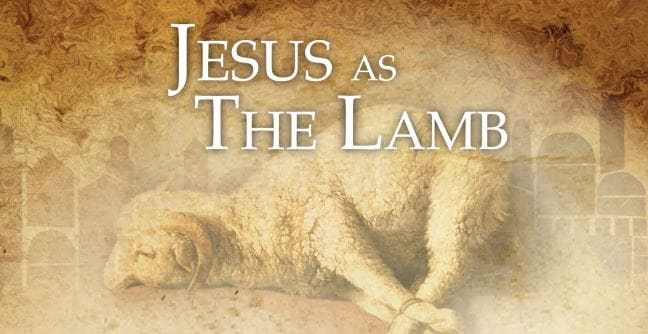Follow the Lamb
In John 5:39, Jesus challenged the Jewish Religious leaders by saying: “Search the scriptures; for in them ye think ye have eternal life: and they are they which testify of Me!”
In 2 Timothy 3:15, Paul told Timothy that the purpose of studying the scriptures was: “To make us wise unto salvation!”
The scriptures bear witness to the coming of the Messiah; the Savior sent from God!
- They tell us of the time and the place of His coming!
- They tell us of the manner of His life, His ministry, His death, His resurrection, His ascension and His promise to return.
- Every event in the timeline of human history is a part of God’s plan for the redemption of lost man.
JOSEPH: The Messianic Patriarch

- There are 130+ parallels between the life of Joseph and the life of Jesus.
- God used the life of Joseph to illustrate His plan to place the Israelites in the Promised Land at the right time for the Messiah’s birth.
- The Saga of the Son – Genesis 37-47 – “God sent me before you to preserve your posterity in the earth; to save your lives by a great deliverance. So, it was not you that sent me hither, but God!” (45:7-8)
Joseph in his father’s house –
- As a “gifted child” of his first wife, Judah showed favoritism to Joseph.
- Being so loved by his father, Joseph was absolutely loyal to him, and tried to do his best to follow after God.
- His brothers hated Joseph so much they put him in a pit, sold him to slave traders, and told their father he was dead
Joseph in Potiphar’s house –
- God caused Joseph to find favor with Potiphar – so much so, Potiphar put Joseph in charge of his house and his estate.
- Potiphar’s wife accused Joseph of rape, and he was put into prison.
- Through his ability to interpret dreams, Joseph found favor with Pharaoh, the King of Egypt, and he appointed Joseph Prime Minister of Egypt!
Joseph as ruler over the house of Egypt –
- For seven years, and with God’s blessing, Joseph led Egypt to raise and store an abundance of food.
- Because of the famine, all the people of the earth came to Egypt to buy food, including his own family from Canaan.
- After some cunning ways and deceptive schemes, Joseph revealed himself to his brothers, and finally to his father.
- In preparing a place for his family to survive the famine, Joseph preserved the “seed” of the Savior!
- The Sins of the Father – Exodus 1-15 – “Now there arose up a new king over Egypt which knew not Joseph.” (1:8)
The opening verses of Exodus tell us that Jacob and his family settled in the “best of the land” of Egypt and they enjoyed “peace and plenty” for 30 years!
- Then a new Pharaoh arose who did not know Joseph or why the Israelites were in Egypt.
- This new Pharaoh feared them because they outnumbered the Egyptians, and he tried to reduce their birthrate, first by increasing their daily labor and finally by destroying all the male babies.
- In Exodus 12:40, the Bible says the Hebrew people were enslaved in Egypt for 400 years.
The two reasons why God allowed the Hebrew people to suffer such cruel treatment for 400 years!
- To prepare them physically, mentally, emotionally and spiritually to occupy the land God promised to Abraham, Isaac and Jacob. (Gen. 15:13-16)
- The physical labor strengthened their bodies for what would be a long journey home.
- The mistreatment served to increase their desire for their freedom and their own homeland.
- The time allowed their population to grow to more than 2 million people.
- To punish them for their wicked treatment of Joseph.
- When Joseph’s brothers sold him into slavery, the “seed of slavery” was sown in their family.
- The harvest of that seed was that their own children and their children’s children spent 400 years as slaves in the brick pits of Egypt!
- “I the Lord your God am a jealous God, visiting the iniquity of the fathers on the children, on the third and the fourth generation of those who hate Me.” (Exodus 20:5)
- The Signs of the Savior – Genesis 37:1-36
| Joseph: The Foreshadow of the Savior |
| JOSEPH |
|
JESUS |
| Gen. 37:3 |
Beloved by their fathers |
Mt. 3:17 |
| Gen. 37:2 |
Regarded themselves as shepherds |
Jn. 10:11–14 |
| Gen. 37:13 ,14 |
Sent by fathers to their brethren |
Lk. 20:13; Heb. 2:12 |
| Gen. 37:4, 5, 8 |
Hated by brethren without a cause |
Jn. 1:11; 7:5; 15:25 |
| Gen. 37:20 |
Plotted against by their brethren |
Jn. 11:53 |
| Gen. 39:7 |
Severely tempted |
Mt. 4:1 |
| Gen. 37:20 |
Taken to Egypt |
Mt. 2:14 ,15 |
| Gen. 37:23 |
Stripped of their robes |
Jn. 19:23, 24 |
| Gen. 37:28 |
Sold for the price of a slave |
Mt. 26:15 |
| Gen. 39:20 |
Bound |
Mt. 27:2 |
| Gen. 39:20 |
Remained silent/offered no defense |
Isa. 53:7 |
| Gen. 39:16–18 |
Falsely accused |
Mt. 26:59, 60 |
| Gen. 39:2, 21, 23 |
Experienced God’s presence |
Jn. 16:32 |
| Gen. 39:21 |
Respected by their jailors |
Lk. 23:47 |
| Gen. 40:2, 3 |
Placed with two prisoners, one was later lost, the other saved |
Lk. 23:32 |
| Gen. 41:46 |
Began ministry at age 30 ministry |
Lk. 3:23 |
| Gen. 41:41 |
Highly exalted after their sufferings |
Phil. 2:9–11 |
| Gen. 41:45 |
Took non-Jewish brides |
Eph. 3:1–12 |
| Gen. 42:7, 8 |
Lost to their brethren for awhile |
Rom. 10:1–3; 11:7, 8 |
| Gen. 45:1–15 |
Forgave/restored brothers |
Zech. 12:10–12 |
| Gen. 41:57 |
Honored by all earthly nations |
Isa. 2:2, 3; 49:6 |







